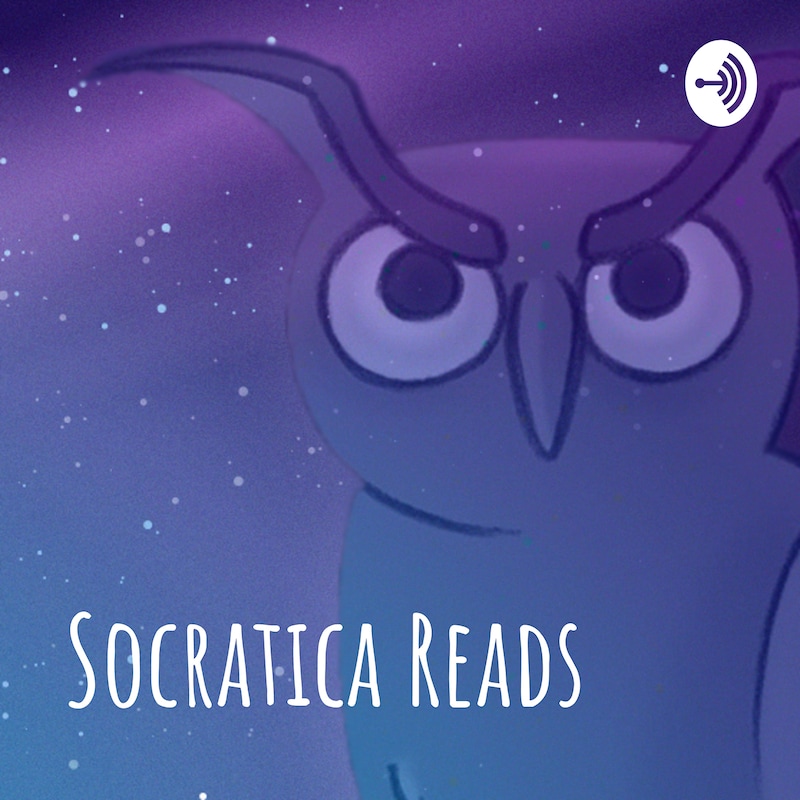Kimberly Hatch Harrison (co-founder of Socratica) hosts this podcast that celebrates the joys of reading. In creating a new illustrated audiobook series for our kids’ channel, Socratica Kids, Kim is revisiting some of her favourite coming-of-age stories that inspired her. In this episode, Kim discusses “The Book of Three” by Lloyd Alexander.
If you would like your own copy of the book discussed, it is available here:
https://amzn.to/3RymWGR
If you prefer, you can buy a boxed set of the first five books of the Chronicles of Prydain:
https://amzn.to/42N6706
Kim’s book: How to Be a Great Student
ebook: https://amzn.to/2Lh3XSP
Paperback: https://amzn.to/3t5jeH3
Kindle Unlimited: https://amzn.to/3atr8TJ
If you'd like to talk about this podcast (and all things Socratica), you can join our Discord by becoming our Patron on Patreon here: https://www.patreon.com/socratica
Socratica Reads is sponsored by The Socratica Foundation as part of their Literacy Campaign.
You can learn more about this educational nonprofit at https://www.socratica.org
Support this work: https://socratica.kindful.com
Transcript:
Welcome Everybody! To Socratica Reads. My name is Kimberly Hatch Harrison, and I’m the co-founder of Socratica. We make educational videos, mainly about STEM topics, and mainly on YouTube, and we create other educational materials you can find on our website, socratica.com.
None of this work would be possible, if I hadn’t grown up to be a reader. My mum read to me at a very young age, and she wasn’t deliberately teaching me to read, but I sort of caught on and taught myself. This happens sometimes, for some kids.
Turns out I’m hyperlexic, and I’m just naturally drawn to the written word. If there are words on a box of cereal, I’m reading it. I want subtitles on my movies. I walk down the streets of a foreign city translating all the street signs. It’s just how I go through life, reading, reading, always reading.
This is not a neutral pursuit. After you read enough, your brain naturally starts synthesizing and integrating, and drawing some meta conclusions from everything you’ve fed in. It’s made everything about my life and my work possible.
That’s why I am determined to help other people FIND their way to the book life. The joy and the POWER of literacy is literally life-changing.
So where do I do this literacy promotion? Well, I’m also the co-founder of the Socratica Foundation, which is an educational non-profit.
One Socratica Foundation project I’m currently working on is an English Language Arts video series called Astrid’s Journal. It’s on our kids’ channel, Socratica Kids, and it’s especially intended for grades 3-5. This is a journal kept by a girl who is about 10 years old, in the year 2525, in a place called Scandiland. In this world, kids experience a very different kind of childhood. We learn about this world through Astrid’s eyes.
Along the way, in addition to reading the story, -we are modeling how useful keeping a journal can be for developing the skills of observation, writing, and also developing emotional intelligence by understanding your reaction to the events of your life.
Did you read any journals or coming-of-age stories when you were a kid? My favourite at that age was Harriet the Spy, which was a big influence on me and by understanding Harriet, I was better able to understand myself.
You might think reading a book is a pretty passive experience, but actually, this can be a surprisingly empowering experience for a kid. These stories often echo the timeless Hero’s Journey, where a novice hears a call to adventure, answers the call, goes through a series of challenges and side quests, almost fails, but pulls through at the end and returns home, wiser and forever changed. We’ve all heard these stories, or read them, or watched movies with this universal plot, but it’s something else when you can SEE YOURSELF in the story.
That’s what makes The Book of Three so powerful for kids.
When you read the Book of Three as a child, it may be one of the first Hero’s Journeys you come across. But if you read it for the first time as an adult, or if you come back to it and re-read it, as I just did, you may see it differently. Maybe you think Lloyd Alexander wrote something a little derivative, like a lite-verison of The Lord of the Rings (or the Hobbit) from Tolkein. Or Homer’s the Odyssey.
But wasn’t it just exactly right for you as a kid?
Here’s what I love about it.
The heroes are NOT heroic. I mean they have heroic aspects that come out under pressure, but they also make so many mistakes. They’re self-centered, and hopeless in a lot of ways. It takes them many times to learn their lesson, and they learn it imperfectly. They’re like us, in other words.
I’m going to start you off at the very beginning when we first meet our unlikely hero Taran, the assistant pig-keeper. He has nowhere to go but up.
Are you ready? Let’s begin.
{Kim reads excerpt}
We’d love to chat more with you about these ideas. Do you have a hero’s journey book that inspired you as a kid? Our Discord Server is open to all of our YouTube channel members, and our Patrons from Patreon. You can join at patreon.com/socratica. Thanks for listening.
—-----
Did you notice there were no interruptions of this podcast? That’s because we’re sponsored by The Socratica Foundation! The Socratica Foundation is dedicated to the three timeless pillars of learning and knowledge: literacy, numeracy (also known as math literacy), and critical thinking. The Socratica Foundation literacy campaign includes such projects as a course on phonics, reading lessons, book donations, and sponsoring this podcast, which celebrates reading. You can learn more about the foundation at socratica.org.
